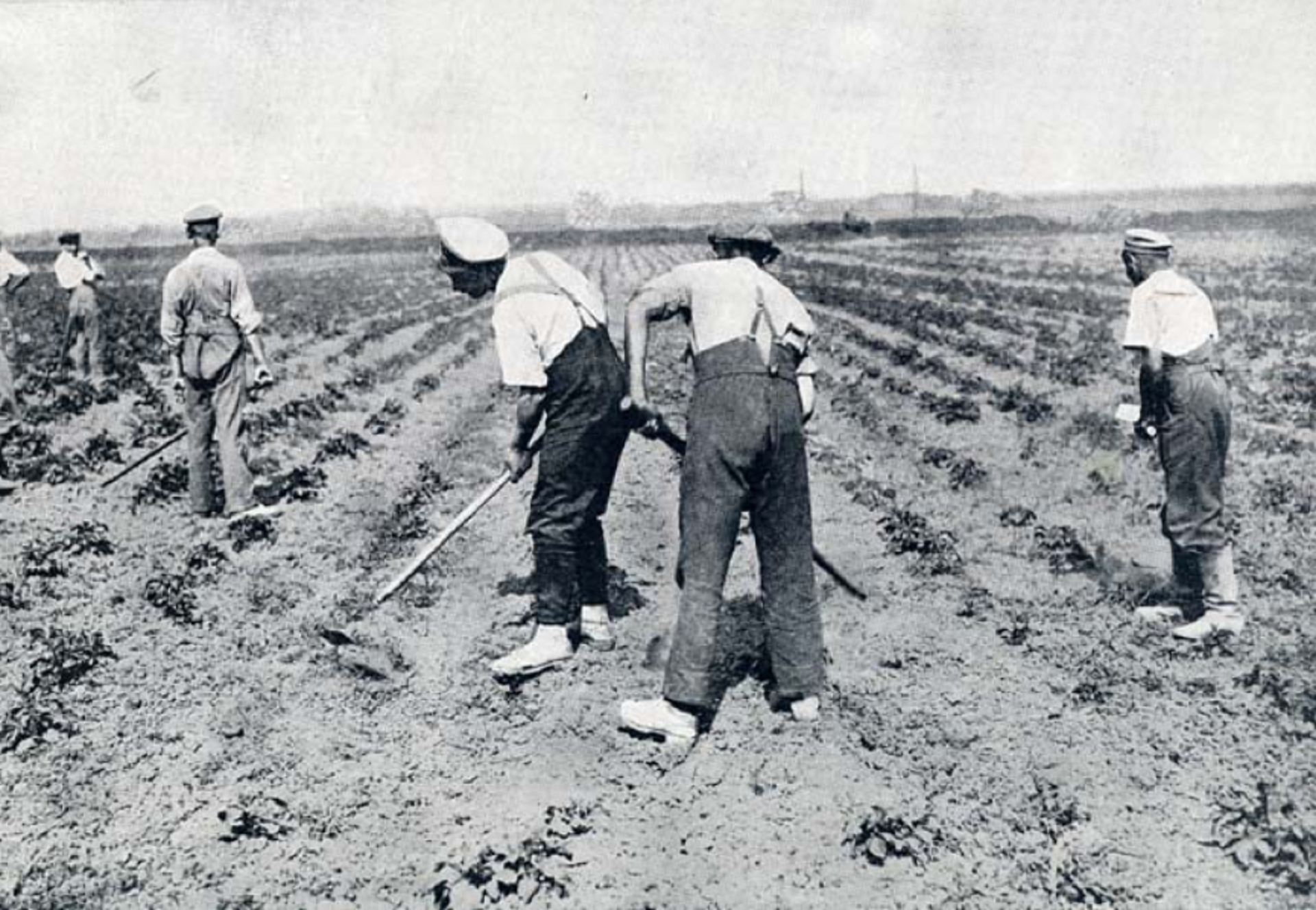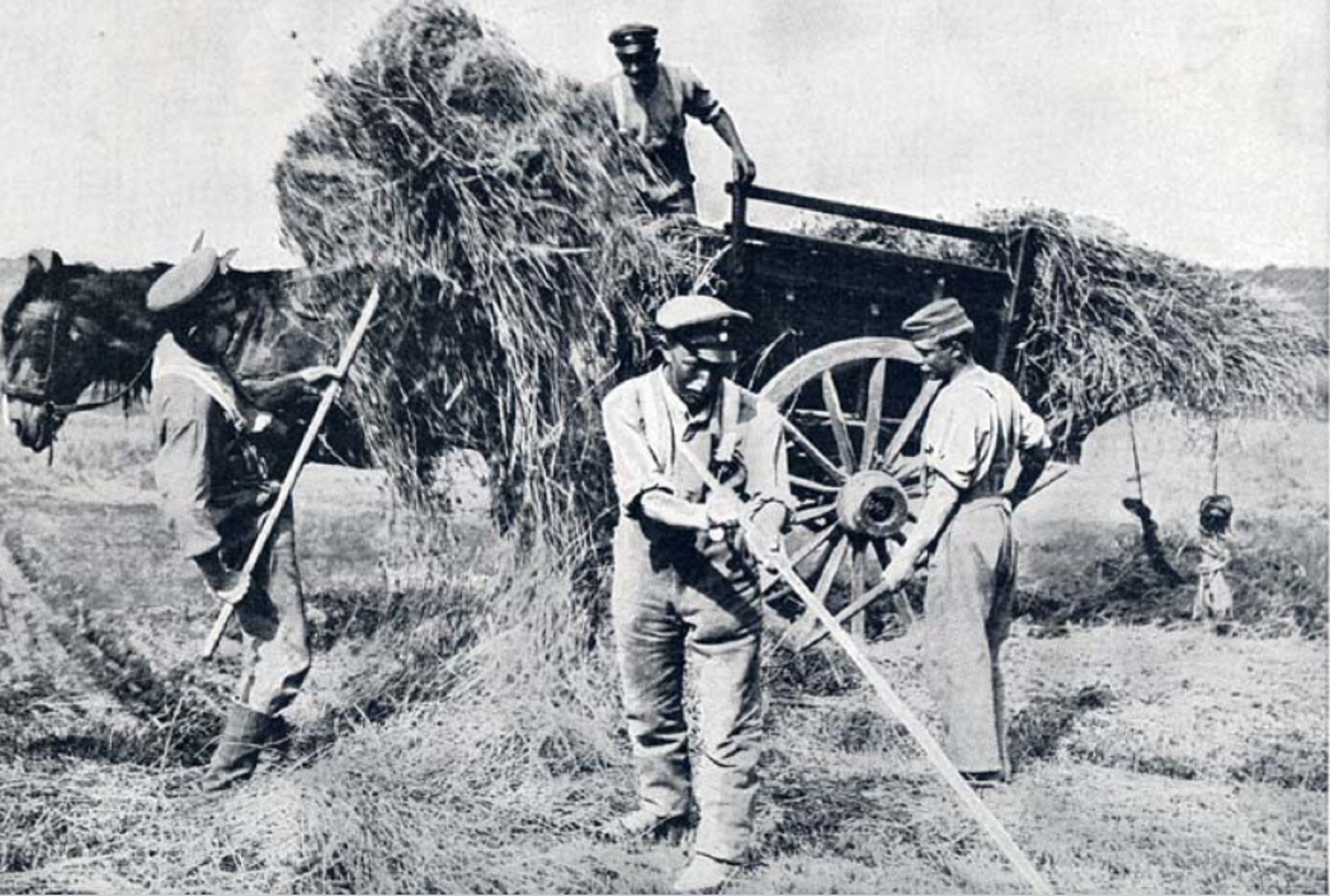German Prisoners of War at Hainault, 1917
Researched by Brian Ecott
"During the 1914-18 War the three large barns and kitchens were taken over by the army and German prisoners were encamped there for the duration. There was also a searchlight based on top of the backs hill beside what is now the 17th fairway of the golf course". Susie Harvey 1910-2004 was born in 4 Foxburrows Cottages, Hainault Forest.

A party of German POW's hoeing a field. Picture from THE GRAPHIC, June 23, 1917
HAINAULT FOREST TO BE PLOUGHED
It is announced that a large part of Hainault Forest is to be ploughed up during the ensuing summer and the necessary labour will be provided by 200 German prisoners of war. Over a thousand acres of this ancient woodland, which forms part of the eastern portion of Epping Forest were formerly good corn land, the property of the Crown and private owners. In 1906 about 800 acres were acquired for the use of the public, and a portion of this area will now be utilised for the production of food in war-time. Birmingham Daily Post Friday 18th May 1917.
Charles Reynolds, Chairman of the Romford District, Essex Agricultural War Committee, based at Fencepiece Farm [1] wrote in the Chelmsford Chronicle 25th May 1917. "Seventy five German prisoners have arrived at Foxburrows Farm, Hainault, for work on the land. Lieut. Parker is in command. The organising of their employment is placed in my hands and I have met with hearty cooperation from neighbouring farmers who have readily applied for their services. In fact nearly the whole gang are already at work on the surrounding farms in squads of 5 and multiples of 5. The 10 that work for me are doing good work in cleaning crops, and the scheme which is the first to be tried in Essex has every prospect of success. The men nearly all had agricultural experience in Germany.

A hay-making party loading up a waggon. Picture from THE GRAPHIC, June 23, 1917
The Coventry Evening Telegraph 24th May 1917 wrote: At Chigwell Row, on the borders of Epping Forest the first batch of German prisoners to be used on the land in Essex began working on Wednesday. They came by train to Grange Hill, 75 of them, and are being accommodated in the farm buildings at Foxborough Farm, Hainault Forest. They have a guard of 35 soldiers, and are working on several farms in the district, all pleased with this relief from camp life monotony. Their pay is 3s.6d (17p.) a day for skilled men, and 2s.6d. (12p.) for others. Some of them speak English.
The Essex Newsman 16th June 1917 reported a meeting of the Romford District War Agricultural Committee was held at the White Hart Hotel, Romford, on Wednesday, Mr. C. E. Reynolds presiding. It was reported that efforts were being made to get more German prisoners to work on Foxburrow Farm, Hainault and also to get a camp of German prisoners in the Dagenham district. – Mr Isaac Gay drew attention to a statement in a London periodical which commented adversely on the allegation that the German prisoners were receiving a certain amount of pay, which was put at a high figure. He pointed out that the amounts which the farmers were to pay for the services of these prisoners were not paid to the prisoners themselves, but to the Government, and the prisoners personally only received a penny an hour. This was evidently a misapprehension which should be cleared up.
Notes:
[1] Fencepiece Farm comprised of the area of the Tudor estate, beginning at Cleves Walk and including the CO-OP and shops at the junction of New North Road and Fencepiece Road, Hainault, Essex.

